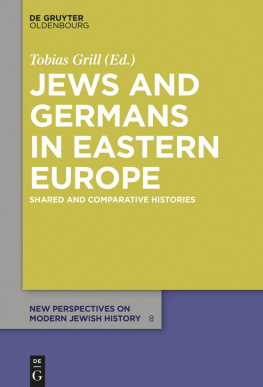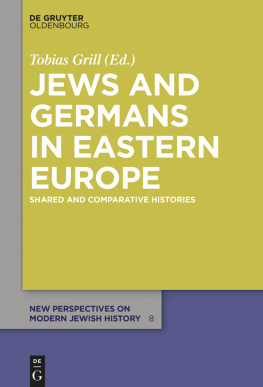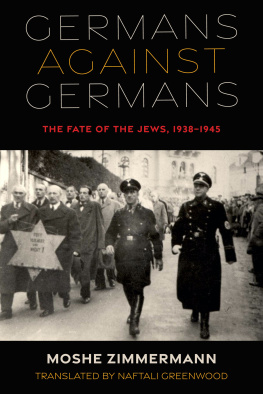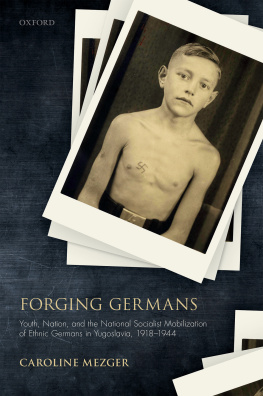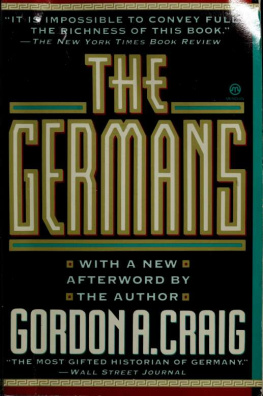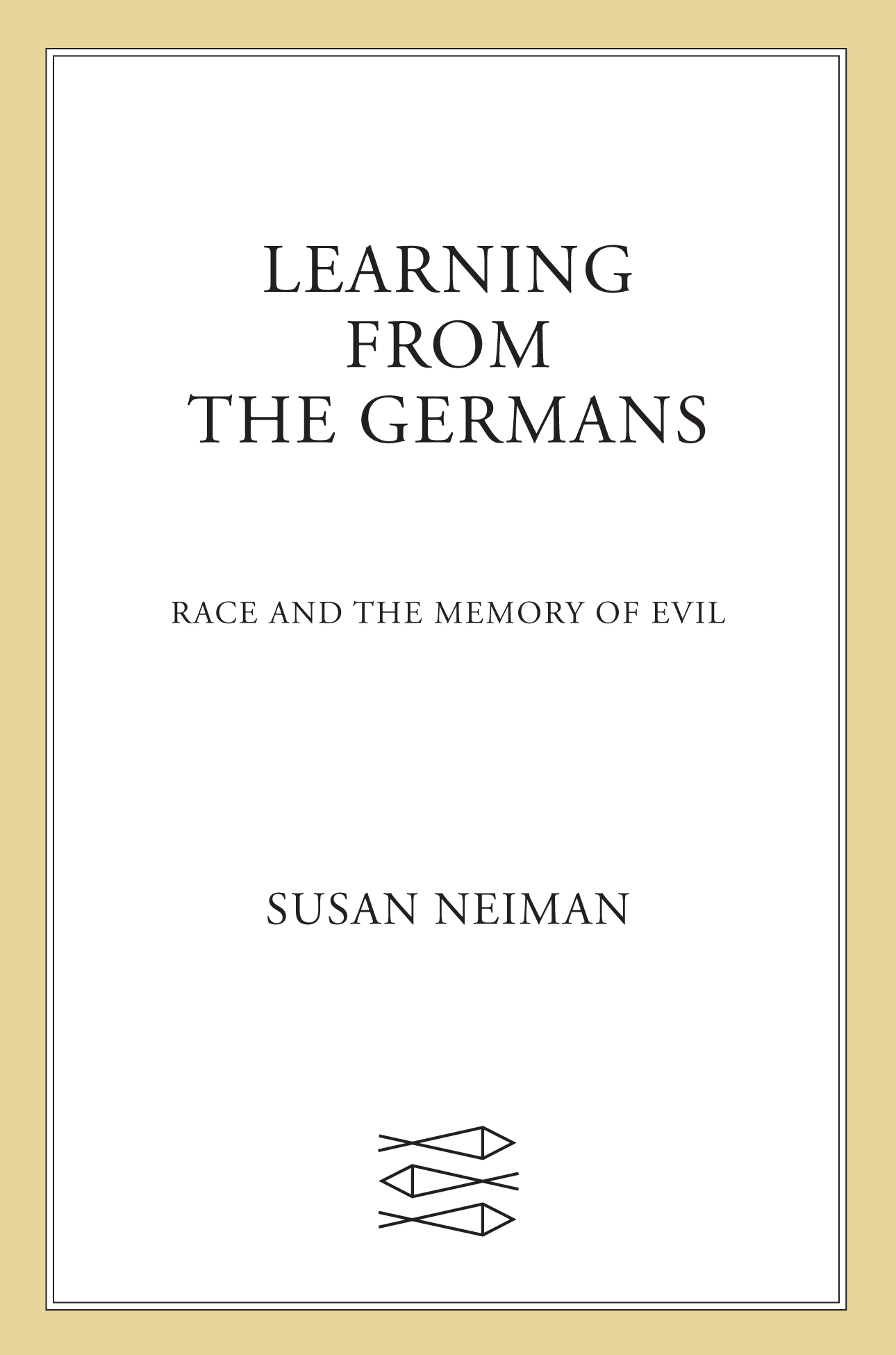The author and publisher have provided this e-book to you for your personal use only. You may not make this e-book publicly available in any way. Copyright infringement is against the law. If you believe the copy of this e-book you are reading infringes on the authors copyright, please notify the publisher at: us.macmillanusa.com/piracy.
Not everything that is faced can be changed, but nothing can be changed until it is faced.
History will not go away, except through our perfect acknowledgment of it.
I began life as a white girl in the segregated South, and Im likely to end it as a Jewish woman in Berlin. Lest you suppose Im tracing an arc that strides the space from perpetrator to victim, let me complicate the story. The question of whether Jews should count as white people was not quite settled in the South where I was born. Theres an old saying, Reverend Wheeler Parker, who was Emmett Tills cousin, told me. If I was Catholic and I lived in the South, Id be worried. If I was Jewish, Id be packing up. If I was black, Id be gone.
When I was eight years old, my best friend solemnly declared she could no longer play with me. We had a lot in common: a preference for building tree houses over playing with Barbie dolls, a love of books whose games in the woods often revolved around searching for a door to Narnia. Still, she ended our friendship after hearing that the Jews had killed Jesus. The temple where my family worshipped had been firebombed, and most of the Jewish community kept their heads down. I am proud that my mother did not. My parents had moved from Chicago to Atlanta shortly before my birth in 1955. My mothers involvement in the campaign to desegregate Atlantas public schools was sufficient to earn her a photo in Look magazine and a number of late-night calls from the Klan.
If we could not be reckoned to the perpetrators, neither did we consider ourselves victims. Jews had been slaves in the land of Egypt and, as such, were obliged to liberal solidarity with other oppressed peoples. That was the major tenet of my mothers homespun theology. Much later, it must have played a role in my decision to study philosophy, and to find my way within philosophy to the work of Immanuel Kant, that dry Prussian professor who wrote the metaphysics of universal justice. It was Kant who insisted that all rational beings should obey the same moral law, and not even God is exempt.
None of my family was a victim of a concentration camp or, as far as I know, a pogrom. Safely landed in Chicago by the early twentieth century, my grandparents never spoke of the eastern Europe theyd left behind. On the contrary, the only grandfather I knew was fiercely American. The first in his family born outside of Odessa, he had a touch of Yiddish accent, but he adored Teddy Roosevelt, visited all the national parks, and served in both world wars. His love of Lincoln was so strong that when he came to visit his Atlanta grandchildren, he taught us all the words to Marching Through Georgia, which we blithely sang in an open convertible, oblivious to any impact it may have had on those Atlantans disinclined to celebrate the march that burned their city to the ground. Today its easy to smile: no wonder I never felt at home in the place. At the time, it only enforced my sense that we were fighters for justice and right. Like any American child, I learned something about the Holocaust, but it was too far away to dent, or even shadow, my own life.
What were present were moments like the sticky summer day in Georgia when my mother invited an African American friend to bring her children across town to play in our yard. Five years after Brown v. Board of Education, native white Atlantans were threatening to close down the school system rather than integrate it, a threat some counties carried out. Using skills shed learned in an early stint in advertising, my mother and her friends from the newly organized HOPEHelp Our Public Educationwere working to forestall the violence the Supreme Court decision ignited elsewhere. Meanwhile, she wanted to prepare her children for desegregation by arranging what was not yet called a playdate. The black folks we knew were all someones servants, and she wanted us to have equal and normal relations with African Americans who were not. Thats why her friend from the movement was there.
Our backyard was large and surrounded by woods where we could hide, hunt for arrowheads, play Capture the Flag. But it was too hot for any of that, and no amount of lemonade could change it.
Lets go to the pool, I said.
We cant, said my mother shortly.
Why not? I began to whine. We always go to the pool when it gets this hot.
We just cant, said my mother. I was too young to notice whether she and her friend exchanged glances.
Then can we go to the lake? The park at Red Top Mountain was usually muddy, not as nice as the pool, but the air was getting stickier by the minute.
We cant go to the lake today either, said my mother.
Why not? I demanded, encouraging my little brother to chime in.
In the end we had to settle for playing under the sprinkler that watered the grass. I didnt settle graciously. How could I guess that it was against the law for black and white children to swim together, not only in the big concrete pools to which white Southerners flocked on such days but in the lakes that studded the county by the grace of God? As far as I could tell, my mother was just being unreasonable. Perhaps it was unreasonable to imagine she could construct normal relations, even for an afternoon, in a system as unreasonable and violent as the segregated South. Im still glad she tried. By the time I knew enough to apologize for the embarrassment my fuss surely caused her, she had trouble remembering the day.
Southern plants still pull me deep, as though I had roots there. Dogwood, honeysuckle, azalea, even a magnolia tree in the backyard of my childhood. The newness of green: chlorophyll sounds like medicine, but that green is the color of life itself. Its the promise that grips us, the world that begins again with each new leaf and each new life, unmarred by sticky fingers or sandbox scuffles. My mother always wanted to follow the springtime, starting in the Deep South and driving steadily north to catch that moment of color ever again. She never did. Every budding tree reminds me of her longing.
Apart from the plants, what sticks in memory are the places I made my own: the smell of hot rain as it hit the marble steps of the local library I visited every week, the kudzu-draped ruins in the woods that must have been a mansion burned by Shermans troops. We lived in one of the prettier not-quite-suburbs on the edge of northwest Atlanta, but everything made it apparent: we were never of them. My insufficiently Southern accent was suspicious. One day I turned in a homework assignment that the teacher had requested: wed been told to ask our parents about their hobbies, the organizations to which they belonged. I still remember the look on my teachers face upon reading that my mother belonged to the ACLU. Isnt that a subversive organization? (Mommy, whats subversive? I had to ask when I got home.)



